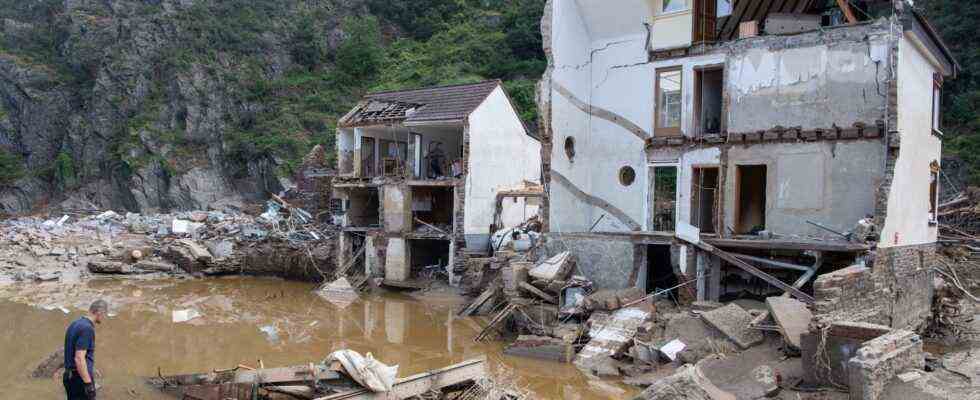Status: 07/23/2021 2:41 p.m.
Many climate experts are convinced that extreme weather situations will occur more and more frequently in the future – and with them extreme damage situations as well. Is there now compulsory insurance against natural hazards?
The material damage caused by the flood disaster is gigantic: after the flash floods and floods last week, the state has already provided 400 million euros – as first aid, so to speak. In addition, a multi-billion dollar development fund is planned.
According to GDV estimates, the amount of damage caused by the most recent disaster will be far higher, at least five billion euros. “It will not fail because of money,” said Federal Interior Minister Horst Seehofer. “People pay taxes for getting help in such situations.”
But is it fair if the general public pays for the damage caused? Couldn’t the building owners get the impression that they don’t have to take care of insurance cover themselves because the state will step in in an emergency? Ultimately, a so-called natural hazard insurance, which insures against extraordinary natural events, would compensate for the financial damage.
Increased risk, no insurance coverage?
The introduction of compulsory insurance for building owners is now being debated because, according to figures from the consumer advice center, only around 46 percent of all private houses in Germany are insured against damage caused by natural hazards such as floods and flooding.
But not everyone who previously wanted insurance against natural hazards got it. Those who live in areas where there is a risk of natural hazards either have to pay very high premiums, accept high deductibles or may not even get the desired insurance cover because of the increased risk, according to the Association of Insureds (BdV).
Around 1.2 million residential properties are located in areas that are particularly at risk from heavy rain. This is shown by a study by the German Aerospace Center (DLR) with the Erfurt analysis company On-Geo. But experts are of the opinion that the consequences of these natural hazards no longer only affect the residents of risk areas and will also occur more and more frequently.
Debate about the consequences
The insurance industry has an obligation to offer all consumers affordable insurance protection, says Klaus Müller, board member of the German Consumer Association (vzbv): “The extent of the flood disaster shows once again how much the damage caused by climate change is increasing for consumers.“
The economist Monika Schnitzer, a member of the economy, thinks the model of compulsory insurance makes sense. This could prevent “some foregoing such insurance, trusting that they will receive help from the state in the event of a disaster,” she quotes “Wirtschaftswoche”. However, the premiums would have to be based on the risks.
Priceless rewards?
The President of the Ifo Institute, Clemens Fuest, calls for a very high deductible in the case of compulsory insurance, “so that the false incentives to build in flood-prone areas are kept within limits”.
The Haus & Grund association, however, rejects compulsory insurance. Association president Kai Warnecke points out that the premiums in risk areas could become unaffordable. “Compulsory insurance, as useful as it may be in the event of damage, will certainly keep the cost of living up,” says Warnecke.
Ernst Rauch, the chief climate scientist at the reinsurer Munich Re, also sees the municipalities as responsible for ensuring more protection against floods. The public sector must systematically adapt the infrastructure to the changes in nature caused by climate change – for example by renaturing streams to give flowing water more freedom during heavy rain.
Insurance companies do not reach their limits
Rauch believes that state-supported elementary insurance is unnecessary in Germany. Insurers and reinsurers have by no means reached the limits of their capacity. In 2017, the biggest loss year, they would have paid more than 100 billion euros in damage worldwide. “In Europe, in Germany, we speak of orders of magnitude that have reached a single-digit, in rare cases double-digit billion euro level.” The question is rather how high the premiums will have to be in the future, according to Rauch.
Jörg Asmussen, General Manager of the GDV Insurance Association, pleads in the Deutschlandfunk also for better prevention: “I think there are many starting points and not just compulsory insurance.”
The GDV assumes that 99 percent of all buildings in Germany could be insured against natural hazards. For the remaining one percent, a societal solution must be found, says Asmussen. The insurance industry cannot alone bear the consequences or the lack of adaptation measures of climate change. But it is also clear that she will take part in the discussion “how we can better protect ourselves against extreme weather risks in the future”.

